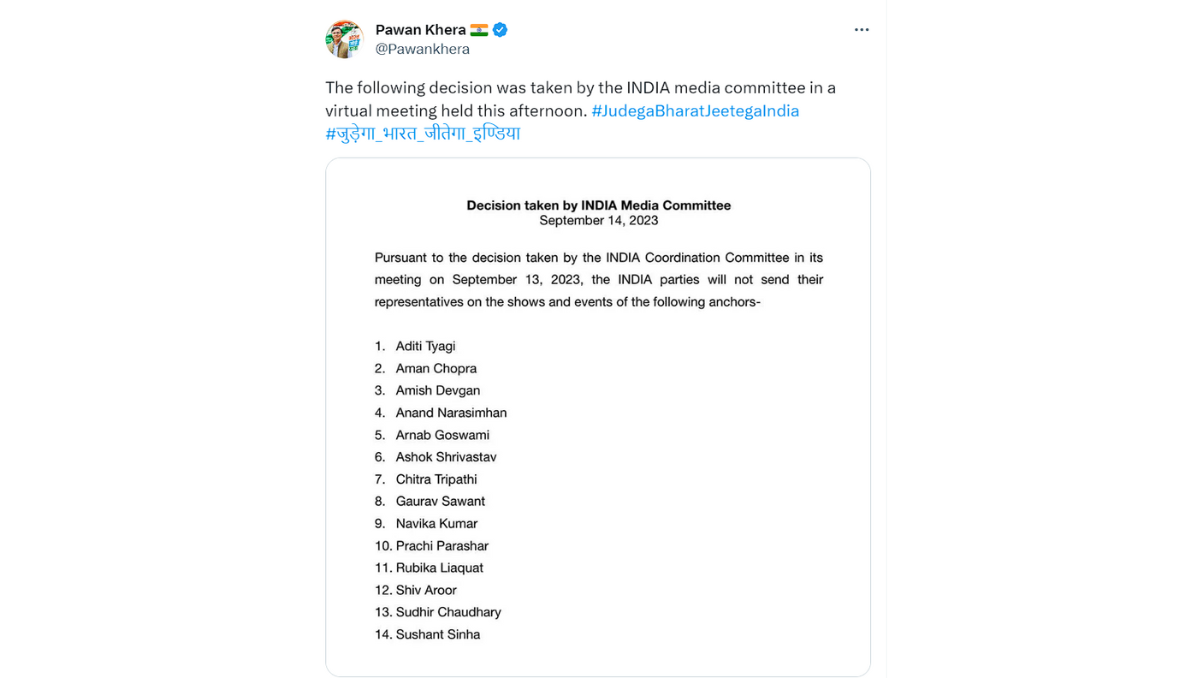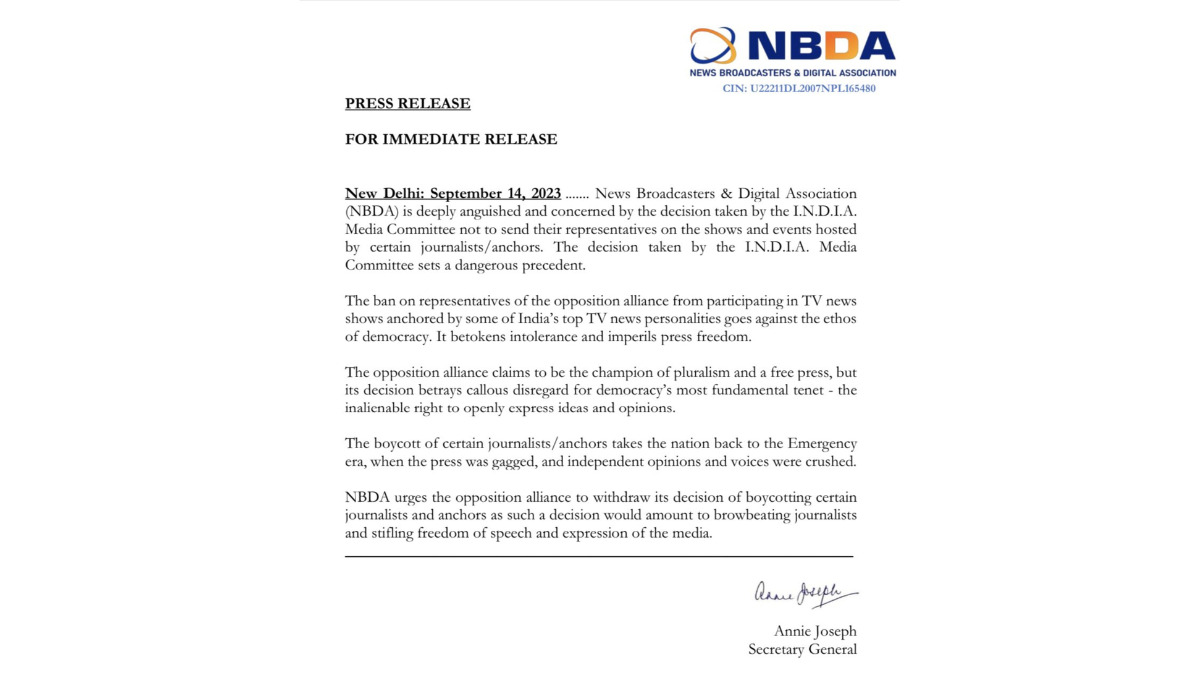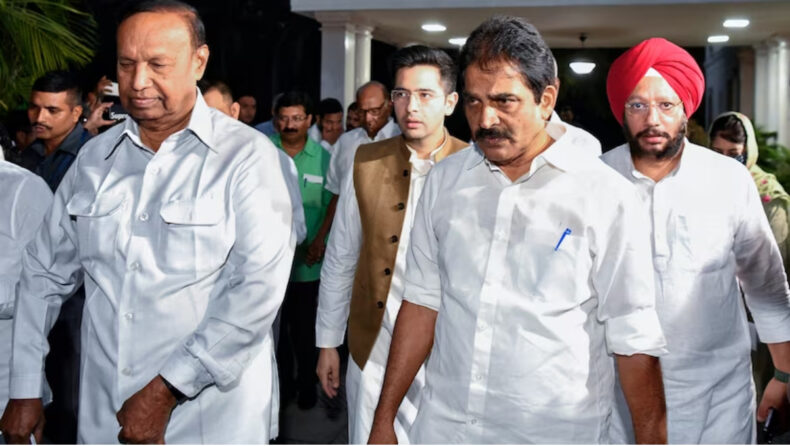INDIA, the opposition alliance, released a blacklist of 14 TV anchors that they would boycott on grounds of peddling hateful content on Thursday.
Table of Contents
Who’s in the blacklist?
The INDIA coordination committee organised a meeting on Wednesday to deliberate on several matters ranging from sharing seats in elections, to drawing up a blacklist of TV anchors to boycott, with the latter being released on Thursday. The Alliance, which holds power in 11 states, declared that no representative would feature on shows helmed by the 14 anchors, while clarifying that the boycott won’t extend to their respective media organisations.
The blacklist includes names such as Aditi Tyagi (Bharat Express), Aman Chopra, Amish Devgan and Anand Narasimhan (News 18), Arnab Goswami (Republic Bharat), Ashok Shrivastav (DD News), Chitra Tripathi and Sudhir Chaudhary (Aaj Tak), Gaurav Sawant and Shiv Aroor (India Today), Prachi Parashar (India TV), Rubika Liyaquat (Bharat 24) and Navika Kumar and Sushant Sinha (Times Now Navbharat).

I.N.D.I.A wants to shut “markets of hatred”
The move has been believed to be the first step of the INDIA bloc in their agenda against “bias and communalism” being allegedly spread by news presenters. Congress media department head Pawan Khera took to Twitter to defend the decision as a measure against a “market of hatred” set up by news channels, while saying that the Alliance doesn’t hold any ill will towards anchors.
The decision was made “with a heavy heart” and out of love for the country, he said, and as a declaration that representatives of the Alliance would refrain to go as “customers” to “these markets of hatred”. The spokesperson condemned the alleged “hate-filled narrative” which they blamed to have deteriorated society and instigated violence, while adding that the blacklist could be expanded or shortened in the coming months.
Reactions to boycott, “Emergency 2.0”
The News Broadcasters & Digital Association (NBDA) voiced their disapproval over the move via a press release, fearing that it would set a “dangerous precedent”. NBDA panned the boycott as undemocratic, intolerant and a threat to press freedom, while accusing the opposition alliance of hypocrisy and disregard towards free speech, likening the move to the gag orders issued against media outlets during the Emergency era of the ’70s.

Avinash Pandey, CEO of the ABP Network (its constituent, ABP News has been accused of being “pro-BJP”) and president of NBDA criticised the move as counterintuitive, while declaring that oppositional representatives would nonetheless continue to receive invitations to their shows.
The BJP also chimed in, with party president J P Nadda viewing the blacklist as something more akin to how the Nazis made lists of whom to target, while accusing oppositional parties of withholding an “Emergency era mindset”. In a social media post, he ranted against “Pandit Nehru”, called ex-PM Indira Gandhi a “gold medal winner” of censorship, and other past figureheads from the INC. The Alliance, according to him, was focused on only “bashing Sanatan Sanskriti” and “bullying the media”.
BJP’s national media head Anil Baluni saw the release of the list and the subsequent boycott as a “highly deplorable” decision that exposed the Alliance’s “highly repressive, dictatorial and negative mindset”, while adding that his party refrained from such “derogatory mindset” which serves to curtail free speech and expression. He accused the opposition of succumbing to “external pressure” in order to damage the nation’s press freedom, while also likening the situation to the Emergency era. Union Minister Jyotiraditya Scindia, in an interview with ANI, criticised the “blackhearted” effort from the Alliance, while claiming that the “people” would instead blacklist the opposition.
Anurag Thakur, Union Minister for the Information and Broadcasting Ministry christened the move as “Emergency 2.0” and an indication of the opposition’s alleged lack of trust in democracy, citing “cases lodged against journalists” in opposition-ruled states like Bengal and Tamil Nadu. The INDIA bloc was again accused of hypocrisy and deviating from its supportive agenda towards freedom of expression and autonomy of the media. Thakur slammed their efforts to “crush” and “pressurise” the media, while calling them the “ghamandia (arrogant) alliance”.
Editor and anchor at Doordarshan Ashok Shrivastav, one of those who was named in the list, drew parallels between his boycott and that of his father during the Emergency, when he allegedly received a MISA warrant for speaking against the Indira Gandhi administration. Shrivastav accused the opposition of wanting to restore conditions to how they were in the 1970s, but was confident in his resolve to “fight” and to “not be scared”.













